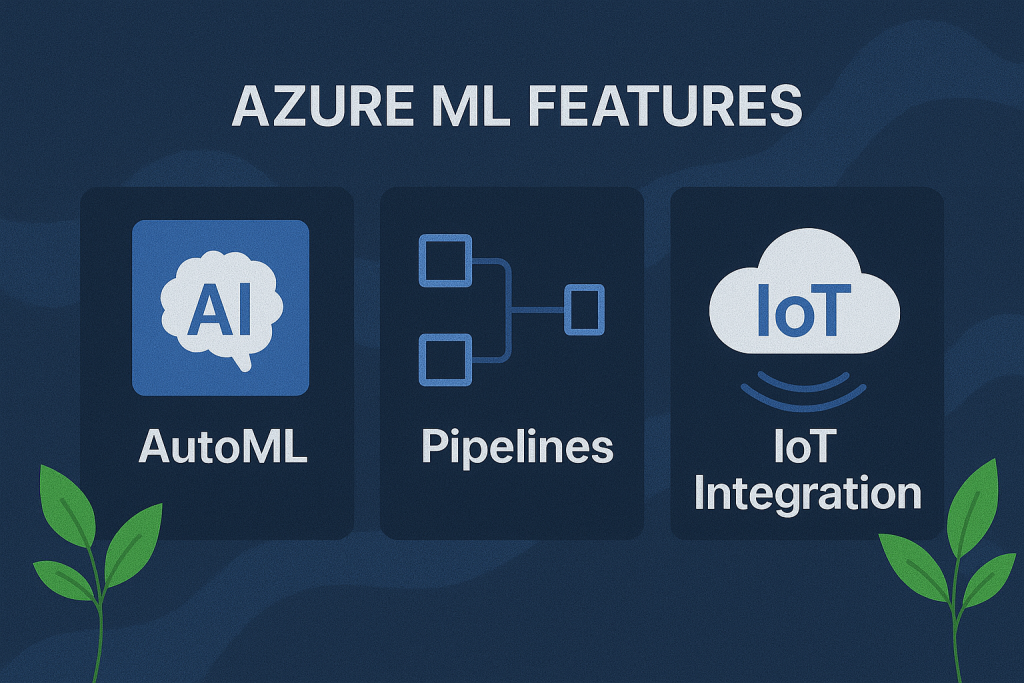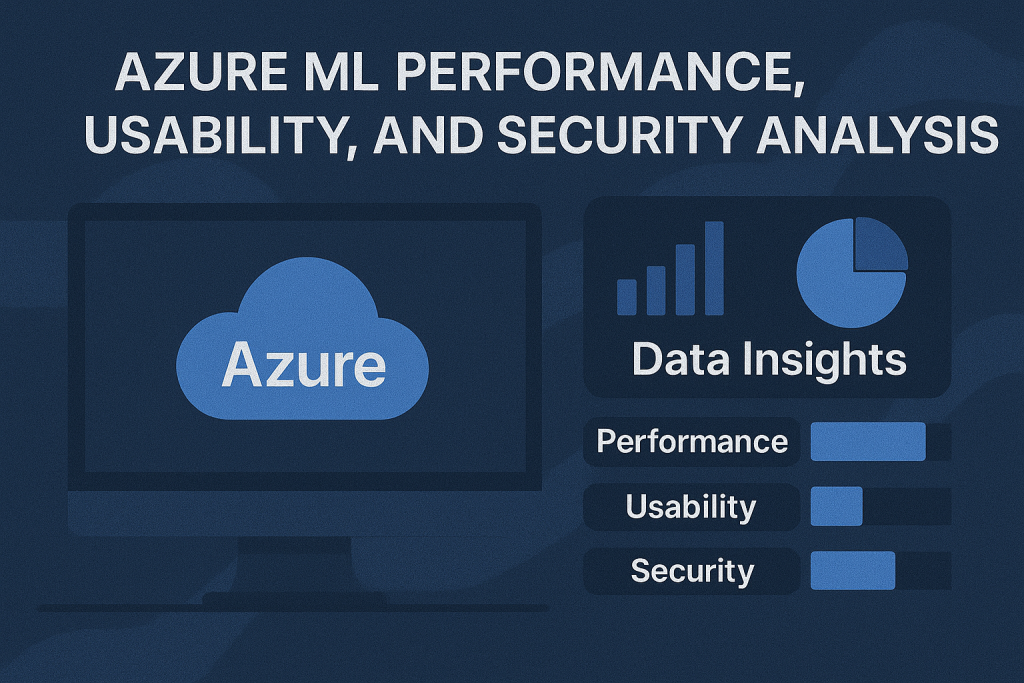
Artificial intelligence is reshaping industries, and Azure Machine Learning (Azure ML) is leading the way. Developed by Microsoft, this cloud-based platform allows data scientists and developers to build, train, and deploy machine learning models with ease.
Machine learning is becoming essential in many fields, from healthcare and finance to automation and IoT devices. Businesses need AI solutions that are not only powerful but also user-friendly and scalable. This review explores Azure ML’s features, pricing, usability, and comparison with competitors to help you determine if it’s the right choice for your AI projects.
Overview of Azure Machine Learning
Azure Machine Learning is a fully managed cloud-based AI platform that enables businesses to create intelligent applications. It caters to both beginners and experienced data scientists, offering no-code, low-code, and full-code development options.
Key Features:
- Automated Machine Learning (AutoML) – Eliminates manual model selection and tuning.
- Drag-and-Drop Interface – Allows no-code model building.
- Advanced ML Pipelines – Supports custom models and automation.
- Integration with IoT Devices – Enhances AI-driven automation.
- Scalability & Security – Leverages Microsoft’s cloud infrastructure.
- Collaboration & MLOps – Facilitates teamwork and deployment management.
The Key Features of Azure Machine Learning

Azure ML offers tools that simplify machine learning development while ensuring flexibility for experts.
1. Automated Machine Learning (AutoML)
AutoML is a game-changer for businesses that lack AI expertise. It automatically selects the best algorithm for a given dataset, reducing the need for manual trial and error. This feature saves time and optimizes performance, making machine learning more accessible.
2. ML Pipelines & Model Deployment
Azure ML provides robust tools to create, manage, and automate machine learning pipelines. MLOps (Machine Learning Operations) is integrated, ensuring smooth collaboration and deployment. Once trained, models can be deployed across cloud, edge, and hybrid environments.
3. IoT & Edge AI Integration
One standout feature is its compatibility with IoT devices. This enables real-time AI-powered analytics, making it ideal for industries like manufacturing, retail, and smart cities. Azure ML can process data locally on devices, reducing latency and improving efficiency.
4. Scalability & Security
Built on Microsoft Azure, this platform ensures top-tier security, compliance, and scalability. Whether you’re a startup or an enterprise, Azure ML can handle projects of any size while maintaining data integrity and protection.
Azure Machine Learning Pros and Cons
Azure ML has several advantages, but it also has some limitations. Below is a detailed breakdown:
| Pros | Cons |
|---|---|
| User-friendly for beginners | Can be expensive for large-scale projects |
| AutoML simplifies AI model training | Requires an Azure subscription |
| Enterprise-grade security & compliance | Some open-source tools have limited support |
| Scalable cloud-based environment | Initial learning curve for advanced tools |
| Supports IoT & edge computing | Need for strong cloud infrastructure |
Azure Machine Learning Pricing Breakdown
Azure Machine Learning follows a pay-as-you-go pricing model, meaning users only pay for the services they use. The cost depends on factors such as compute resources, storage, data processing, and model deployment.
| Plan | Price | Features |
|---|---|---|
| Free Tier | $0 | Limited compute, no enterprise features |
| Pay-as-you-go | Varies | Charges based on resources & usage |
| Enterprise | Custom | Full access, premium support |
The free tier is great for testing but has limitations. Larger companies benefit from enterprise plans, which provide dedicated resources and support.
How to Optimize Azure ML Costs
- Use the Free Tier – Test projects without incurring costs.
- Choose the Right Compute Instance – Avoid over-provisioning resources.
- Utilize Spot VMs – Lower cost by using spare Azure capacity.
- Optimize Data Storage – Move less-used data to Cool or Archive Storage.
- Deploy Models Efficiently – Use serverless inference where possible.
In-Depth Analysis of Azure Machine Learning

Azure ML is widely used across different industries. Let’s examine its performance, usability, and security in more detail.
Performance & Scalability
Azure ML leverages Microsoft’s cloud infrastructure, making it highly scalable. It supports distributed computing, enabling large datasets to be processed efficiently. GPU and CPU acceleration ensures faster model training.
In addition, Azure Machine Learning provides flexible compute options that allow teams to scale resources up or down depending on workload demands. This makes it ideal for businesses running experiments, training deep learning models, or deploying AI solutions globally. Enterprises can also benefit from seamless integration with Azure Synapse Analytics and Azure Databricks, which enhances big data processing. With automated resource management and high availability, Azure ML ensures that machine learning projects remain reliable, cost-effective, and capable of supporting real-world production environments.
Usability & Learning Curve
Azure ML offers a drag-and-drop interface for beginners, while experienced developers can use Python, R, and CLI-based tools. However, new users may find advanced features challenging at first.
Security & Compliance
Security is a priority for Microsoft. Azure ML follows strict compliance protocols such as GDPR, HIPAA, and SOC 2. It provides data encryption, access control, and secure deployment environments.
Azure Machine Learning vs. Competitors
Azure ML competes with Google Vertex AI and Amazon SageMaker. Below is a side-by-side comparison:
| Feature | Azure ML | Google Vertex AI | Amazon SageMaker |
|---|---|---|---|
| AutoML Support | Yes | Yes | Yes |
| IoT Integration | Yes | No | Yes |
| No-Code Options | Yes | Yes | No |
| Security Compliance | Strong | Moderate | Strong |
| Enterprise-Grade MLOps | Yes | Limited | Yes |
Azure ML stands out in terms of security, scalability, and IoT support, making it a strong choice for enterprises.
Conclusion: Our Final Verdict on Azure Machine Learning
Azure ML is a versatile and powerful machine learning platform. It provides a balance of automation, scalability, and security, making it an excellent choice for businesses and researchers.
Azure Machine Learning Rating
Azure Machine Learning Rating
- Ease of Configuration: ★★★★☆ (4.5/5)
- Users find it easy to set up and configure the Azure Machine Learning workspace.
- Data Accessibility & Integration: ★★★★☆ (4/5)
- It supports various data access methods, but some users mention a learning curve.
- Overall Usability: ★★★★☆ (4/5)
- While intuitive, some advanced features require deeper technical knowledge.
FAQ
What makes Azure Machine Learning different from other AI platforms?
Azure ML offers AutoML, IoT integration, and enterprise-grade security. It is designed to simplify AI model development while ensuring scalability and compliance.
Is Azure Machine Learning suitable for beginners?
Yes, Azure ML has a drag-and-drop interface and AutoML tools that help beginners create models without coding. However, advanced features require some technical knowledge.
How much does Azure Machine Learning cost?
Azure ML pricing depends on usage. It has free, pay-as-you-go, and enterprise plans. Costs vary based on compute resources and model deployment.
Resources
- G2. Azure Machine Learning Reviews
- Capterra. Azure Machine Learning Studio
- TrustRadius. Azure Machine Learning Overview
- YouTube. Azure ML Tutorial
- Twitter. User Review
